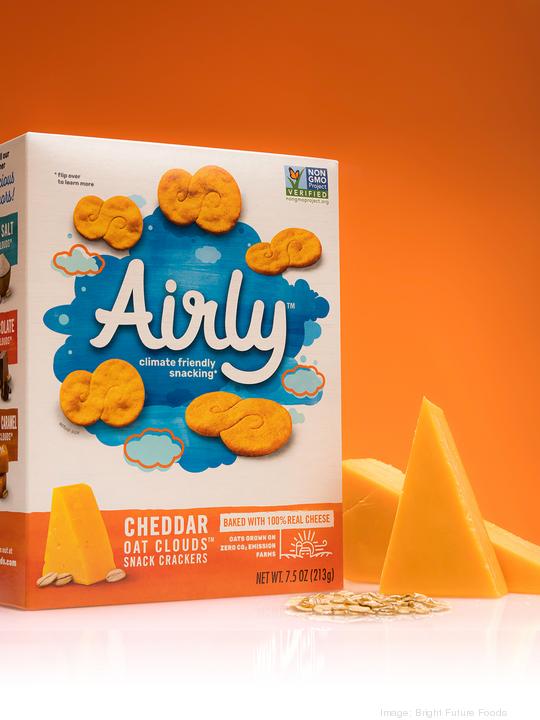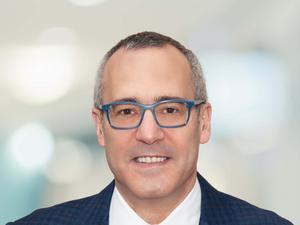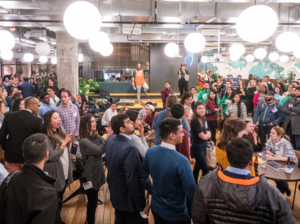![Airly Founders[95]](https://media.bizj.us/view/img/12069168/airly-founders95*540xx4073-2288-0-0.jpg)
When the co-founders of newly launched St. Louis-based food company Airly Foods started to develop their first product, Chief Marketing Officer Jennifer McKnight says the company knew it was chasing a “big hairy audacious goal.”
It wanted to fight back against climate change through food. Audacious, indeed.
“What if instead of just trying to be less bad, we could actually use food to reverse climate change,” said McKnight. “As we first kind of sat with it, we’re driven by the idea that today, depending on what study you look at, somewhere between 25% and 30% of greenhouse gas emissions come from the global food supply chain.”
Airly has started its effort to reverse climate change, with the brand in May releasing what it describes as the "first-ever climate-friendly snack." That product, its Airly Oats Clouds crackers, is made through farming practices designed to take carbon dioxide out of the air.
The new snack food company was born out of Brentwood-based Post Holdings (NYSE: POST), the $5.7 billion consumer packaged goods company with a roster of cereal and snack food products. Airly Foods is the first company launched through Bright Future Foods, a wholly owned subsidiary Post founded in 2020 to incubate new technologies and innovations in the food and beverage sector. The startup is led by co-founders McKnight and Chief Science Officer Mark Izzo, both of whom have held previous innovation-focused roles at Post, and Kris Corbin, who has held prior senior-level R&D positions with Weston Foods and Pinnacle Foods.
Airly has operated on a rapid research and development timeline, bringing its crackers product to market in less than a year and half after identifying its climate positive approach. Airly sources its oats through zero carbon dioxide emission farms that take the carbon dioxide from the air and store it in the farm's soil. The company said it has worked with Fort Collins, Colorado-based SoilMetrics, which provides consulting and farm modeling software for greenhouse gas emissions and carbon dioxide sequestration, as its key carbon farming advisor.

The company currently retails four flavors of its crackers: cheddar, sea salt, chocolate and salted caramel. The products are sold on the company’s website, Amazon.com and at a limited number of grocery stores. Each box of Airly’s crackers eliminates between 18 grams and 21 grams of carbon dioxide from the air, according to Airly. That equates to 2,500 to 2,900 beach balls of fresher air, a comparison McKnight said Airly makes to help consumers more clearly understand the impact of the product. Airly includes its carbon footprint on each box of its crackers, which McKnight said both provides transparency and helps consumers understand the how their purchase can make a difference.
“I think we all want to do the right thing. We all want to make smart choices. But the underlying consumer insight here is that a lot of times it can feel pretty disempowering. Climate change is huge. It’s scary. It’s hard to believe I, as one person, can make a difference and I’m not quite sure what to do to make that difference. We try to make it as easy as possible with Airly,” McKnight said.
In addition to its carbon farming practices, Airly also purchases carbon credits to counterbalance the environmental impact of its production and transportation processes. It says the carbon credits back U.S. agriculture and forestry projects. Airly has sought out partners to boost sustainability in its entire production process, Corbin said.
“Every piece of the product needs to be addressed. We’re doing that aggressively. We're recruiting experts within all those different areas to partner with us, so we can be the first to have zero-emission baking and the first to have zero-emission transportation along with the first to have zero-emission grains,” he said.
For example, Bright Future Foods has formed a joint collaboration with EverGrain, an Anheuser-Busch-backed company that repurposes barley from the brewing process and turns it into protein and fiber ingredients. The two companies in April said they will work together to develop snack food products that use EverGrain’s repurposed barley and Airly’s “climate-positive” oats.
Airly’s co-founders say they're operating the new company with a startup mentality, hoping to bring a disruptive approach that leads others to develop food more sustainably. Longer term, they envision expanding the brand with both more cracker flavors and additional products.
“We’re going to keep giving consumers more and more products. You can imagine, any grain-based category, we could do this in. Our snack crackers are just kind of the first to get people engaged,” Izzo said. “Airly is geared to become the next big thing. It was not meant to be any kind of a niche product. It was meant to be the next big brand and it’s geared for that success, in its formulas, in how we make it, in what’s meant to do and what the consumers want today."











